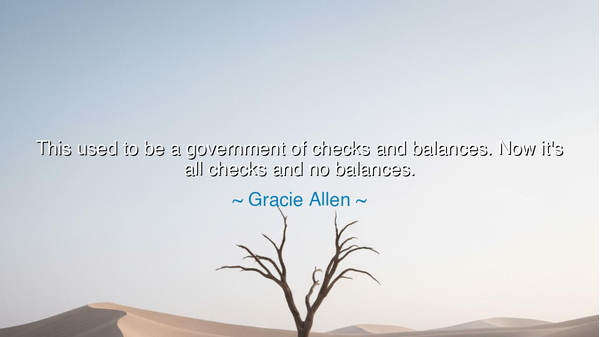
This used to be a government of checks and balances. Now it's all
This used to be a government of checks and balances. Now it's all checks and no balances.






In the golden age of wit and laughter, when humor carried the weight of truth disguised in mirth, the beloved comedian Gracie Allen spoke a line that shimmered with both irony and wisdom: “This used to be a government of checks and balances. Now it’s all checks and no balances.” Though her words were delivered in jest, they cut through the veil of comedy like the blade of a philosopher’s pen. Beneath the laughter was a lament — a reflection on how easily the noble design of governance, built to preserve justice and accountability, can be corrupted by greed, waste, and imbalance. Her humor was the laughter of the wise, a mirror held up to power, showing that even in democracy, responsibility can decay into indulgence if vigilance fades.
The origin of this quote rests in the mid-twentieth century, when Gracie Allen, alongside her husband George Burns, graced the airwaves and stages of America with a humor that was gentle yet piercing. Unlike the rhetoric of politicians or philosophers, her words carried the subtle authority of truth wrapped in laughter. In that postwar era, the government had grown large, the public debt had swollen, and bureaucracy had multiplied. The “checks” she referred to were not the checks of restraint or accountability, but those written in endless sums — government spending that reached far beyond balance. Her wit was a lighthearted cry of concern: that the system of checks and balances, crafted by the Founders to restrain tyranny, had given way to a new imbalance — one of fiscal excess and political indulgence.
To grasp the depth of her humor, one must return to the heart of the Founding Fathers’ vision. When the framers of the Constitution forged the American Republic, they built it upon the sacred principle of checks and balances — the idea that no branch of government should hold power unchecked, that each must restrain the other for the good of all. The Executive, Legislative, and Judicial branches were designed to act like the three legs of a great tripod — each supporting and steadying the others. It was a system crafted not on trust, but on wisdom — the understanding that even the noblest of men, when given unchecked authority, will be tempted by ambition. But as Gracie’s quip revealed, that delicate balance can be eroded not only by tyranny, but by complacency and excess.
History offers countless echoes of her insight. In the days of the Roman Republic, the Senate and the consuls once shared power in careful equilibrium. Yet as wealth flowed into Rome from its conquests, so too did corruption. The treasury overflowed with gold, but the virtue of its statesmen was spent. Senators began to buy influence, consuls began to seek glory, and soon the Republic — once balanced by law and restraint — collapsed under the weight of greed and ambition. Rome learned, as all nations eventually do, that when the people grow accustomed to luxury and the rulers grow accustomed to spending, checks without balances become the prelude to decline.
Gracie Allen’s humor, though light in tone, carries a lesson of enduring gravity. Her words remind us that the strength of a government lies not only in its structure, but in its spirit — in the integrity and restraint of those who serve within it. The machinery of democracy cannot preserve itself if its citizens and leaders forget the discipline that sustains it. A nation that writes endless “checks” — whether literal or moral — without balancing them against justice, prudence, and virtue, spends not only its wealth but its soul. What begins as generosity can become indulgence; what begins as protection can become dependency.
Her wit also speaks to the duty of the people, for in a democracy, the rulers are but a reflection of the ruled. If the government has grown extravagant, it is because the people have grown complacent. Each citizen must become, in their own way, a guardian of balance — questioning excess, demanding accountability, and remembering that freedom is not maintained through laughter alone, but through vigilance. The humor of Gracie Allen, like the satire of the ancient Greeks, was not meant merely to amuse, but to awaken — to stir the conscience of the nation through the gentlest of truths.
The lesson that flows from her jest is simple yet profound: balance is the foundation of good governance. Without it, justice becomes partial, power becomes reckless, and prosperity becomes fragile. A government must balance its strength with humility, its compassion with responsibility, its ambition with restraint. So too must the people balance their desires with discipline, their rights with duty, their laughter with wisdom.
And so, though she spoke with a smile, let us hear the solemn music beneath Gracie Allen’s laughter: “This used to be a government of checks and balances. Now it’s all checks and no balances.” Her words, like the fables of the ancients, remind us that humor often hides the deepest truth — that a nation which forgets to balance its freedom will one day lose it. Therefore, let every generation strive to restore what was lost, to honor what was built, and to remember that even in jest, truth remains the surest guardian of liberty.






AAdministratorAdministrator
Welcome, honored guests. Please leave a comment, we will respond soon